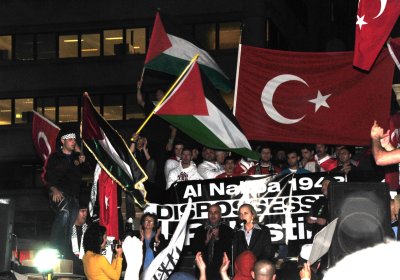June 1 emergency protest in Melbourne against Israel's attack on the unarmed Gaza aid flotilla. Photos by Sue Bolton.
839
International outrage has been expressed through ongoing mass protests around the world, condemnation of Israel's actions by most governments (apart from the US), and calls for the immediate lifting of Israel's blockade of Gaza.
Condemn Israel's attack on the Gaza flotilla
Socialist Alliance statement June 3, 2010.
Socialist Alliance condemns the completely unwarranted and murderous attack by Israeli armed forces on the civilian flotilla carrying aid to Gaza.
Not since the French Secret Service blew up the Rainbow Warrior in Auckland Harbour in 1985 has there been such a brazen act of international piracy by a sovereign state.
Adelaide: Friday June 4, 3.30pm, Victoria Square, protest organised by Action for Palestine. Bring placards, banners, your friends and your outrage! Brisbane: Friday June 4, 5pm, Brisbane Sq, Cnr Queen and George Sts. Canberra: Thursday June 3, 4pm rally at Garema Place organised by AJPP and UnionsACT. Hobart: Friday June 11, 5pm. Corner of Murray and Macquarie St. Melbourne: Saturday June 5, 2pm, outside State Library, City.
* * Update: On May 31 heavily-armed Israeli commandos attacked the unarmed Freedom Flotilla. Israeli forces have fired on activists in at least one of the boats, with media reports of up to 10 people killed and many more injured.
Bolivarian Republic of Venezuela
Ministry of People's Power for Foreign Affairs
Caracas, May 31, 2010
The President of the Bolivarian Republic of Venezuela, Commander Hugo Chavez, emphatically condemns the brutal massacre perpetrated by the State of Israel against the members of the Liberty Flotilla, as a result of the war action started by the Israeli Army against defenseless civilians, who tried to carry humanitarian aid supplies to the Palestine people of the Gaza Strip, who are victim of the criminal blockage imposed by the State of Israel.
On May 18, the Queensland Crime and Misconduct Commission (CMC) announced it would take over primary responsibility for investigating all deaths in police custody in the state.
This followed the recommendation made by deputy chief magistrate Brian Hine when he delivered his findings on May 14 to the third coronial inquest into the 2004 death of Aboriginal man Mulrunji Doomadgee in the Palm Island watch house.
On November 19, 2004, Mulrunji was walking home when sergeant Chris Hurley, driving by in his police vehicle, arrested him on a drunk and disorderly charge.
In the wake of Britain’s inconclusive general election, there is much talk of the “national interest”.
It’s said that politicians of all parties have to pull together to address the crisis caused by the country’s enlarged fiscal deficit. Specifically, they must agree to a package of deep public spending cuts.
Nothing, it is said, is more urgent, more unavoidable.
In contrast, it seems climate change can be left perpetually on the backburner — though there is a far greater expert consensus about its dangers than those of a large deficit.
With a mass general strike on May 20 in the private and public sectors and a large demonstration in Athens and other cities, the workers of Greece continued the struggle to overturn an austerity program imposed by the Greek government, European Union (EU) and the International Monetary Fund (IMF).
Participation in the strike was as big in the private sector as in the public sector, which is the target of most of the austerity measures.
The obscenely wealthy have been celebrated again with the release of Business Review Weekly’s annual Rich 200 list. Sitting in top spot is Westfield Group chairperson Frank Lowy, whose personal fortune is estimated to be $5.04 billion. That's about 17,000 times our 2010 fighting fund target here at Green Left Weekly.
The following is abridged from a motion unanimously passed on May 22 by the general membership of the Climate Emergency Network, Victoria. For more information on CEN, visit the group's website.
***
Over the past decade or so, a climate movement has developed in many countries, both developed and developing. There has been a tendency for the climate movement in North America, Europe, and Australia to focus on ecological modernisation as a climate change mitigation strategy.
- Page 1
- Next page






